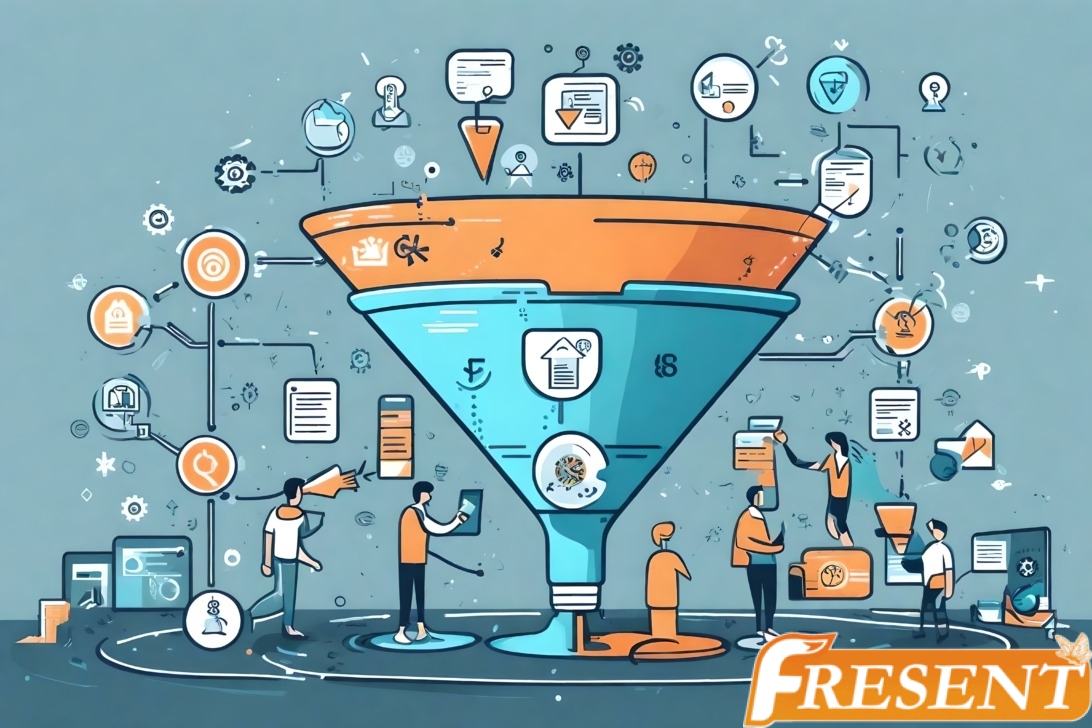Are you tired of spending countless hours manually generating leads and trying to convert them into paying customers? Look no further than SaaS marketing automation. With this powerful tool, you can streamline your lead generation and conversion process, freeing up valuable time for other important tasks.
SaaS marketing automation is the process of using software to automate repetitive marketing tasks such as email campaigns, social media posts, and lead scoring. By automating these tasks, you can focus on more strategic activities that will help grow your business. In this article, we will explore the benefits of SaaS marketing automation, how it works in the sales funnel, best practices for implementation, future trends and innovations in the industry, and tips for choosing the right platform for your business needs. So buckle up and get ready to learn how SaaS marketing automation can transform your business!
Introduction to SaaS Marketing Automation
You’ll be amazed at how SaaS marketing automation can simplify your lead generation and conversion process, making it easier than ever to grow your business. With the help of SaaS marketing automation tools, small businesses can streamline their sales funnel, save time and money, and reach out to potential customers more effectively. These tools automate repetitive tasks such as email campaigns, social media posts, and lead scoring so that you can focus on other important aspects of your business.
One of the key elements of SaaS marketing automation is AI-powered technology. This technology allows for intelligent customer segmentation, personalized messaging based on behavior tracking, and predictive analytics. By leveraging AI in your marketing efforts, you can ensure that every message resonates with your target audience while reducing human error and increasing efficiency.
By implementing SaaS marketing automation into your business strategy, you are setting yourself up for success. Not only will it make it easier for you to generate leads and convert them into paying customers but it will also provide valuable insights into the effectiveness of your marketing efforts. In the subsequent section about ‘benefits of saas marketing automation,’ we’ll dive deeper into how these tools can benefit small businesses like yours even further.

Benefits of SaaS Marketing Automation
Ah, the joys of having a robotic assistant that can take care of all your tedious marketing tasks while you sit back and sip on your coffee. SaaS marketing automation is the key to streamlining your lead generation and conversion process. By implementing this technology, you’ll be able to improve the efficiency of your marketing campaigns, increase customer engagement, and ultimately maximize ROI.
Here are four benefits of SaaS marketing automation that will help you achieve these goals:
- Personalization techniques: With SaaS marketing automation tools, you can personalize every interaction with potential customers. This means tailoring your message based on their interests, behaviors, and preferences.
- Lead nurturing: Once you’ve captured a lead’s attention, it’s important to keep them engaged until they’re ready to buy. Through automated workflows, you can guide leads through the sales funnel by sending timely and relevant content.
- Sales insights: With access to real-time data about lead behavior and interactions with your brand, you can make informed decisions about how to optimize your sales process.
- Time savings: By automating repetitive tasks such as email campaigns or social media posts, you’ll have more time to focus on strategic initiatives that drive growth.
Incorporating SaaS marketing automation into your strategy will give you a competitive edge in today’s digital landscape. Understanding the sales funnel is crucial for making informed decisions about how best to leverage this technology to drive conversions.
Understanding the Sales Funnel
To truly optimize your sales process and maximize revenue, it’s essential to have a clear understanding of the different stages of the sales funnel and how they impact potential customers. The stages of the funnel include awareness, interest, consideration, intent, and finally conversion. Each stage requires a different approach to lead qualification and nurturing.
During the awareness stage, potential customers are just becoming aware of your product or service. Lead qualification at this stage involves identifying if they are in your target audience and determining their level of interest. Once you’ve qualified them as a lead, it’s important to nurture them with educational content that builds trust and establishes your brand as an authority in your industry.
The consideration stage is where leads begin to consider whether or not they need or want what you offer. At this point, it’s important to provide more detailed information about the benefits of your product or service while also addressing any objections or concerns they may have. Lead qualification at this stage involves identifying their specific pain points so that you can tailor your messaging accordingly. By understanding these stages and implementing effective lead qualification strategies at each one, you can improve conversions and ultimately increase revenue for your business.
Moving onto the subsequent section about ‘lead scoring and nurturing’, by using data-driven insights from lead scoring tools, you can better understand which leads are most likely to convert based on their behavior throughout the sales funnel.
Lead Scoring and Nurturing
As you navigate through the sales funnel, your potential customers leave behind valuable clues about their level of engagement with your brand. By leveraging lead scoring and nurturing strategies, you can gain deeper insights into their behavior to personalize your approach and increase the likelihood of conversion.
Lead scoring models assign a numerical value to each lead based on data such as website visits, social media activity, email engagement, and more. The higher the score, the more likely they are to convert. With this information, you can prioritize leads for follow-up and tailor your messaging accordingly.
Lead nurturing strategies involve building relationships with leads over time by providing relevant content that addresses their pain points and interests. This keeps them engaged with your brand until they are ready to make a purchase. Automated emails can be used to deliver this content at regular intervals while also promoting special offers or events.
By implementing effective lead scoring models and nurturing strategies, you can streamline your lead generation process and improve overall conversion rates. In our next section on email marketing automation, we will explore how these techniques can be integrated into an automated email campaign for even greater success.
Email Marketing Automation
With email marketing automation, you can take your communication with potential customers to the next level and really hit the nail on the head in terms of delivering personalized content that speaks to their interests and needs. Personalization techniques allow you to tailor your emails based on customer behavior, past purchases, demographics, and more. This means you can send targeted messages that resonate with each individual recipient.
To make this process even more effective, email segmentation strategies are crucial. By dividing your email list into smaller groups based on specific criteria (such as location or purchase history), you can create highly targeted campaigns that speak directly to each group’s unique needs and preferences. This not only increases engagement rates but also helps build stronger relationships with your subscribers.
Overall, implementing email marketing automation is a powerful way to streamline lead generation and improve conversion rates. By leveraging personalization techniques and segmentation strategies, you can create compelling campaigns that truly resonate with your audience. In the next section about social media management, we’ll explore another key aspect of SaaS marketing automation: how to effectively engage with potential customers on social media platforms.

Social Media Management
Are you struggling to effectively engage with potential customers on social media platforms? Let’s dive into social media management and explore some strategies to improve your online presence. Social media is a highly effective tool for lead generation and conversion, but only if used correctly. With the right content creation strategies and social media analytics, you can reach your target audience and turn them into loyal customers.
To start with, it’s essential to create quality content that resonates with your audience. This means understanding their pain points and delivering value through informative blog posts, engaging videos or eye-catching graphics. By doing so, you’ll build trust and establish yourself as an authority in your industry. Additionally, posting regularly will keep your followers engaged with what you have to offer.
Social media analytics are another crucial aspect of effective social media management. These tools allow you to track how well your content is performing by measuring engagement rates such as likes, shares or comments. You can use this data to optimize future campaigns for maximum effectiveness.
Incorporating these strategies into your social media management plan can help streamline lead generation efforts significantly. In the next section about analytics and reporting we’ll cover how tracking these metrics across multiple channels can provide valuable insights into which campaigns are most successful in driving conversions for your business.
Analytics and Reporting
When it comes to analytics and reporting, there are two key points that you should keep in mind: Key Metrics to Track and Customizable Reports. The first point is all about identifying the most important metrics for your business and tracking them consistently over time. This will help you make data-driven decisions that can improve your marketing campaigns and overall business performance. The second point is focused on creating reports that are tailored to your specific needs, so you can get the insights you need quickly and easily. By keeping these two points in mind, you can unlock the power of analytics and reporting to take your marketing automation efforts to new heights.
Key Metrics to Track
Track these key metrics to see how effectively your saas marketing automation is streamlining lead generation and conversion: you’ll be able to assess what’s working well and identify areas for improvement. First, keep an eye on lead quality by tracking the number of leads generated, as well as the sources that bring in the most qualified leads. This will help you determine which channels are worth investing time and money into. Next, monitor your conversion rates – both overall and by channel – to gauge how effective your messaging and offers are at persuading prospects to take action. Lastly, make sure you’re accurately measuring ROI by implementing attribution modeling techniques that show which campaigns or touchpoints are driving revenue.
By monitoring these key metrics, you can fine-tune your saas marketing automation strategy for optimal results. With a deeper understanding of lead quality, conversion rates, and ROI tracking techniques such as attribution modeling under your belt, you’ll be better equipped to make informed decisions about where to allocate resources in order to achieve greater success with less effort. Now let’s move on to exploring customizable reports…
Customizable Reports
With customizable report templates, you can easily visualize and analyze your marketing data to make informed decisions about where to allocate resources. These reports allow you to track key metrics such as website traffic, lead generation, and conversion rates. By using data visualization techniques such as charts and graphs, you can gain a comprehensive understanding of how your marketing campaigns are performing.
Customizable report templates also allow you to tailor your reports to specific audiences or goals. For example, create a report for the executive team that highlights overall performance and ROI, while creating a separate report for the sales team that focuses on lead generation and conversion rates. With the ability to customize reports, you can ensure that every stakeholder in your organization has access to the information they need to make informed decisions about their respective areas of responsibility. As you dive deeper into SaaS marketing automation features like customizable reports, it’s essential that these tools integrate seamlessly with other systems currently in place.

Integrations and Compatibility
You can easily connect your existing tools and platforms to our saas marketing automation software, thanks to its extensive integrations and compatibility. This means that you don’t have to worry about switching systems or losing important data when implementing our solution. Here are three integration options that our software supports:
- CRM Integration: Our marketing automation software integrates with popular CRMs such as Salesforce, HubSpot, and Zoho CRM. This allows for seamless transfer of lead data between the two systems, ensuring a smooth sales process.
- Email Marketing Integration: With our email marketing integrations, you can synchronize your email campaigns with our automation workflows. Popular email marketing platforms like Mailchimp and Constant Contact are supported.
- Social Media Integration: Our social media integrations allow you to monitor and track social engagement on different channels from within the same platform. You can also schedule posts in advance without having to leave the system.
Compatibility concerns should not be an issue when integrating with our saas marketing automation software since we support a wide range of tools and platforms. We understand that each business has unique needs, which is why we offer customization options to ensure seamless integration with your existing setup.
As you move forward with implementation and onboarding, rest assured that we will provide ample support for any questions or concerns you may have during this process. Our team is dedicated to making sure that your transition is as smooth as possible so that you can start seeing the benefits of streamlined lead generation and conversion right away.
Implementation and Onboarding
As you begin implementing and onboarding your new SaaS marketing automation platform, there are several key points to keep in mind. First, it’s important to develop a solid plan and strategy for how you’ll use the tool to achieve your specific business goals. Second, you’ll need to ensure that the technical setup is properly configured and integrated with all relevant systems. Finally, effective training and support will be essential in getting your team up-to-speed quickly and maximizing the value of your investment.
Planning and Strategy
Developing effective planning and strategy is crucial in saas marketing automation for streamlining lead generation and conversion. Strategic considerations involve identifying your target audience, understanding their needs, and creating a comprehensive plan to reach them with compelling messaging. Your implementation planning should include setting achievable goals, outlining timelines, defining key performance indicators (KPIs), and determining the necessary resources.
In order to successfully implement your strategic plan, you will need to have a solid technical setup in place. This involves selecting the right software platform for your business needs, integrating it with other tools as needed, and ensuring that all team members are trained on how to use it effectively. With proper planning and execution of both your strategy and technical setup, you can optimize your saas marketing automation process for maximum lead generation and conversion success.
Technical Setup
Having a solid technical setup is crucial for maximizing success in implementing your saas marketing strategy and reaching your target audience. The technical setup involves the implementation process of various tools, such as CRM software, marketing automation platforms, email marketing services, analytics tools, and more. These tools help you manage leads effectively by automating the lead generation process, scoring leads based on their behavior and interests, nurturing them with targeted content, and tracking their progress through the sales funnel.
To ensure that your technical setup works seamlessly, it’s essential to have a team of experts who can handle the installation, configuration, integration, and maintenance of these tools. They should also be able to customize the settings according to your business needs and provide timely support whenever required. By investing in a robust technical infrastructure for your saas marketing automation system, you can streamline lead generation and conversion processes while saving time and resources. With all these factors in place for your Technical Setup section completed smoothly without any issues or errors during implementation.
Moving forward into training and support will help you further optimize this system for maximum efficiency.
Training and Support
You’re going to love the next step in optimizing your technical setup: getting expert training and support that will make you a master of these tools in no time! The best SaaS marketing automation platforms offer comprehensive training programs that can help you and your team effectively use their features. You’ll learn how to set up campaigns, track customer engagement, and analyze data with ease.
Training effectiveness is also crucial for successful implementation. Many platforms offer online courses, webinars, or even one-on-one sessions with specialists to ensure you have all the knowledge and skills needed to take full advantage of the software. In addition, support resources such as user guides, forums, and customer service representatives are available 24/7 to address any questions or issues that might arise during implementation.
With this level of support at your fingertips, it’s no wonder why so many businesses are able to achieve measurable results from their marketing automation efforts. The next section will dive into case studies and success stories that demonstrate just how effective these tools can be when used correctly.
Case Studies and Success Stories
By showcasing real-world examples of how our saas marketing automation tool has helped businesses streamline their lead generation and conversion processes, we can demonstrate the effectiveness of our product through case studies and success stories. Here are a few examples:
- Company A saw an increase in leads by 40% after implementing our saas marketing automation tool. They were able to use the data collected to personalize their outreach efforts, resulting in higher engagement rates with potential customers.
- Customer testimonials show that Company B was able to reduce their sales cycle by 30% using our tool. With automated lead nurturing and scoring features, they were able to focus on high-quality leads rather than wasting time on uninterested prospects.
- ROI analysis conducted by Company C showed that they experienced a 300% return on investment within the first year of using our saas marketing automation tool. By automating repetitive tasks such as email follow-ups and social media posting, they were able to allocate more resources towards revenue-generating activities.
These success stories not only showcase the capabilities of our product but also provide evidence for its effectiveness. As a business owner or marketer, you want to know that your investment will yield positive results. With concrete examples like these, we hope you can see the value in integrating saas marketing automation into your strategy.
Moving forward, let’s explore some common challenges and solutions when it comes to implementing this type of technology in your process…

Common Challenges and Solutions
One of the biggest hurdles businesses face when implementing saas marketing automation is getting their team on board with the changes. This technology can greatly benefit lead generation optimization and conversion rate improvement, but it requires a shift in mindset and processes. Some team members may be resistant to change or unsure of how to use new tools effectively.
To overcome these challenges, it’s important for businesses to provide thorough training on the new technology and its capabilities. Team members should also be encouraged to experiment with different features and strategies to find what works best for their specific role and goals. Additionally, regular communication and feedback sessions can help address any concerns or questions that arise during the transition.
Overall, while implementing saas marketing automation comes with its own set of challenges, it’s worth investing time and resources into streamlining lead generation and conversion processes. By providing the necessary support and resources for your team, you can ensure a successful implementation that ultimately leads to improved results. In the next section, we’ll discuss some best practices for maximizing the benefits of this technology even further.
Best Practices for SaaS Marketing Automation
If you want to make the most out of your marketing strategies, it’s crucial to follow these best practices for utilizing saas automation tools effectively. First, focus on lead qualification by identifying and prioritizing leads based on their level of engagement with your brand. This can be done through lead scoring, which assigns points to each lead based on their actions and behaviors. By focusing on qualified leads, you can prioritize your efforts and allocate resources more efficiently.
Secondly, campaign optimization is essential in ensuring that your marketing efforts are effective. Utilize A/B testing to experiment with different messaging or visuals and track the impact of each variation. This will help you identify what works best for your target audience and optimize future campaigns accordingly.
Lastly, don’t forget about personalization. Use data-driven insights to tailor messaging and content based on the interests and behaviors of individual leads. This will not only increase engagement but also improve conversion rates by delivering a more personalized experience.
Looking towards the future trends and innovations in SaaS marketing automation, there is no doubt that artificial intelligence (AI) will play an increasingly critical role in streamlining processes and improving results. By leveraging AI-powered tools like predictive analytics or chatbots, businesses can automate tasks such as lead scoring or customer service inquiries while providing personalized experiences at scale. As technology continues to evolve rapidly, it’s important to stay up-to-date with new developments in order to remain competitive in today’s digital landscape.
Future Trends and Innovations
The future of digital marketing is a vast ocean of possibilities, with artificial intelligence advancements and personalized experiences at the forefront of innovation. AI has been making waves in the industry as companies seek to automate their processes further. With the help of AI, businesses can streamline lead generation and conversion.
Moreover, automation in customer service is also gaining traction. Chatbots are becoming increasingly popular, allowing customers to interact with a virtual assistant that can answer basic questions and provide support 24/7. This technology not only saves time but also reduces costs for businesses while providing a more seamless experience for customers.
As we look towards the future of SaaS marketing automation, it’s evident that artificial intelligence will play an even more significant role in streamlining processes and enhancing customer experiences. Businesses that adopt these innovative technologies will be better equipped to compete in today’s fast-paced digital landscape. In choosing the right SaaS marketing automation platform, it’s essential to consider how well it integrates with AI-powered tools to ensure you’re maximizing its potential for your business growth.
Choosing the Right SaaS Marketing Automation Platform
When you’re looking to take your business to the next level, choosing the right platform for automating your marketing processes is crucial. With so many options on the market, it can be overwhelming to know where to start. To ensure you make an informed decision, consider the platform features and pricing comparison of each option.
Firstly, evaluate what features are important for your business needs. Some platforms offer more advanced lead scoring and nurturing capabilities while others focus on email marketing automation or social media management. Additionally, some platforms may have integrations with other tools that are essential for your business operations. Make a list of must-have features and narrow down your options accordingly.
Secondly, compare pricing plans among potential platforms. Some may charge per user or limit certain functionalities in lower-tier plans. It’s important to understand not only the upfront costs but also any additional fees that may come with using certain features or exceeding usage limits. Take into consideration both short-term and long-term costs when making your decision.
As you weigh out each option based on platform features and pricing comparison, remember that this decision will greatly impact how efficiently and effectively you can streamline lead generation and conversion in your business operations. Choose wisely!
Conclusion and Takeaways
In conclusion, it’s important to carefully evaluate the features and pricing of potential platforms when choosing a marketing automation tool for your business, as this decision will greatly impact your overall efficiency and success. There are several key takeaways that can help guide you in making the right choice.
Firstly, consider the specific needs of your business and choose a platform that offers the necessary features to meet those needs. This may include lead scoring and segmentation capabilities, email marketing automation, or integration with other tools such as CRM systems.
Secondly, be mindful of pricing structures and ensure that the platform you choose fits within your budget while still providing the functionality you require. Look for flexible pricing plans that allow you to scale up or down as needed based on changes in your business operations and growth.
Overall, taking these factors into account when selecting a SaaS marketing automation platform can help streamline lead generation and conversion efforts while improving overall efficiency and effectiveness in reaching your target audience. Keep these final thoughts in mind as you begin exploring options for implementing marketing automation into your business strategy.
Conclusion
Congratulations! You now have a clear understanding of how SaaS marketing automation can streamline lead generation and conversion. By utilizing the benefits of automation, you can create a more efficient sales funnel that focuses on lead scoring and nurturing. This allows you to deliver personalized content to your leads, increasing the chances of converting them into paying customers.
But wait, there’s more! Email marketing automation is another crucial aspect of SaaS marketing automation. It allows you to send targeted emails to specific segments of your audience, ensuring that they receive relevant information at the right time. Best practices for SaaS marketing automation include creating engaging content, staying organized with your data management, and continuously evaluating and adjusting your strategy.
As technology continues to evolve rapidly, it’s essential to stay up-to-date with future trends and innovations in SaaS marketing automation. Choosing the right platform is also crucial for success in this area. Remember to prioritize ease-of-use and flexibility when selecting a provider.
In conclusion, implementing SaaS marketing automation can significantly improve your lead generation efforts while increasing conversions in an efficient manner. Don’t let manual processes hold you back – embrace the power of automation today!

